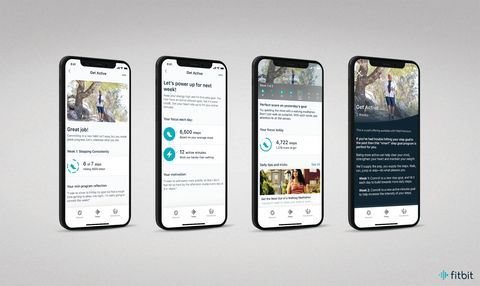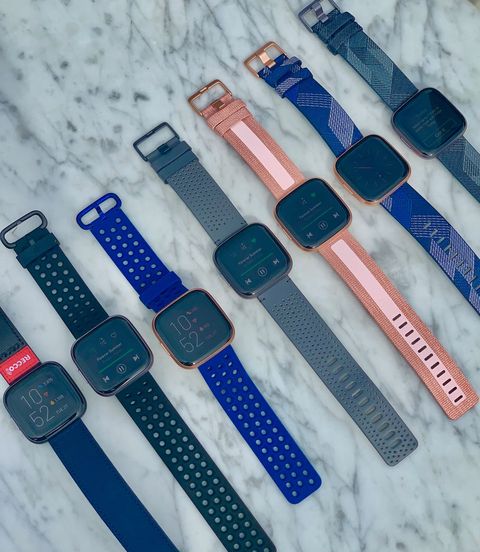Fitbit Is Ready to Make Your Fitness Tracker Actually Useful
Every time I’ve ever written about a fitness tracker or activity-focused smartwatch, I’ve included some sort of caveat that runs along these lines: The device will record loads of data, but won’t give you much help figuring out what to do with all that information.
Fitbit is trying to change that problem. When brand announced its latest line of products and services yesterday at a rooftop event in New York City, the most intriguing news wasn’t the upcoming Versa 2 smartwatch (which does look sharp, more on that in a moment). The centerpiece of the presentation—at least for me—was Fitbit Premium, a new subscription service designed to give both new and longtime wearers more direction about how to actually use all of the biometric data they’ve collected with their trackers.
This service could be a game-changer for the fitness tracking world if all goes according to Fitbit’s plan. Right now, most apps only provide surface-level guidance for how to use their insights—push notifications to move, for example, or suggestions for how to best maximize a night’s sleep. Workout-centric apps, meanwhile, often lack any real insight into the user’s physical condition, which can make the virtual coaching they provide a poor match for individual users who aren’t ready for even basic routines.
The feedback that Fitbit says will be provided in the new Premium service will instead help users in a more instructive, holistic capacity, with meal planning guidance, personalized workouts, premium “challenges” for collaborative exercises with other users, and even wellness reports to send to medical professionals that pull from the data. This idea goes beyond the step count to meet the user where they are, which could be key to beginner to intermediate-level users. The same users won’t be those hitting the gym every day or tracking every aspect of their performance with gadgets like the WHOOP strap—but if Premium can live up to this early billing, it could help a lot of people create better habits.
But that’s not the only news that came out of the event. Here’s some more information about Fitbit’s latest announcements.
Fitbit Premium

Fitbit
Launch: September 2019; $9.99/month or $79.99/year
The new subscription service aims to offer health guidance through a tiered section of the Fitbit app. The company says Premium is aimed at beginner-level exercisers who might look for “extra motivation and support,” with a goal to help people making healthy behaviors routine.
The service will offer nine programs at launch, which range from sleep (Get More Zzz’s) to diet (Kick Your Sugar Habit). Premium subscribers will also have access to detailed Sleep Score analysis and video and audio workouts on the Fitbit Coach platform, which uses insights from data and user feedback to tailor the experience. Later this year, the company says it will add integrations with more apps, starting with Headspace, Yoga Studio by Gaiam, and Daily Burn.
Premium subscribers will also be able to take their data to the doctor’s office, with an accessible wellness report to send to general practitioners, nutritionists, and trainers. The company didn’t specify exactly which data would be included in the report, but specified that only relevant measures would be shared, with app-identified trends and graphs.
Fitbit will also launch one-on-one coaching for users who want even more guidance, aiming to begin in 2020. According to Fitbit reps, the initial pilot “will include 10 certified health and wellness coaches, which includes licensed clinicians, that have been extensively vetted against industry standards. Our health and wellness coaches also have access to registered nurses, dietitians, psychologists and certified diabetes educators, among other specialties.” When Men’s Health asked how exactly the coaches would be certified, a rep clarified that the coaches will be “either a Certified Health Coach OR licensed health professionals (RD, RN, LCSW, etc.). All coaches are either certified or licensed at the time they begin coaching any Fitbit users and they must keep their certifications and licenses up to date.”
Fitbit Versa 2 Smartwatch

Brett Williams/Men’s Health
Release: September 15; $199.95 or $229.95 (Special Edition)
Fitbit’s latest smartwatch provides an update to the main branch of the Versa line, which also includes the slightly less-powerful Versa Lite Edition. The Versa 2 takes on the streamlined one-button design of the Lite Edition, and is compatible with all of the accessories, like bands and chargers, of the other Versa-branded watches. Like the other versions, the Versa 2 boasts a long-lasting battery—Fitbit claims you’ll get more than two days worth of juice with the display set to always-on mode, and over five days with normal settings.
The Versa casing was redesigned to feature a larger display and comes in three colors—black, grey, and copper rose. Under the case, there’s a new, faster processor that Fitbit eagerly touted at the event and a built-in microphone. That enables Amazon Alexa, a new feature that will give users access to a digital assistant on their wrist and put Fitbit on the same playing field as smartwatches from Apple and those that run Google’s Wear OS. The integration isn’t exactly what you’ll find in an Echo speaker; instead, Fitbit says Alexa responds with text responses on the watch screen.
To add to the smart features, both versions of the Versa 2 will feature the NFC Fitbit pay capability (the feature was only available on the Special Edition before) and a new Spotify app will finally come to the Fitbit ecosystem.
You can preorder the Versa 2 starting today on Fitbit.com.
Fitbit Aria Air Smart Scale
October 2019; $49.95
Fitbit is also rolling out a budget version in its Aria smart scale line. The Bluetooth-enabled scale connects to the Fitbit app to provide additional insights, like BMI.
Source: Read Full Article


